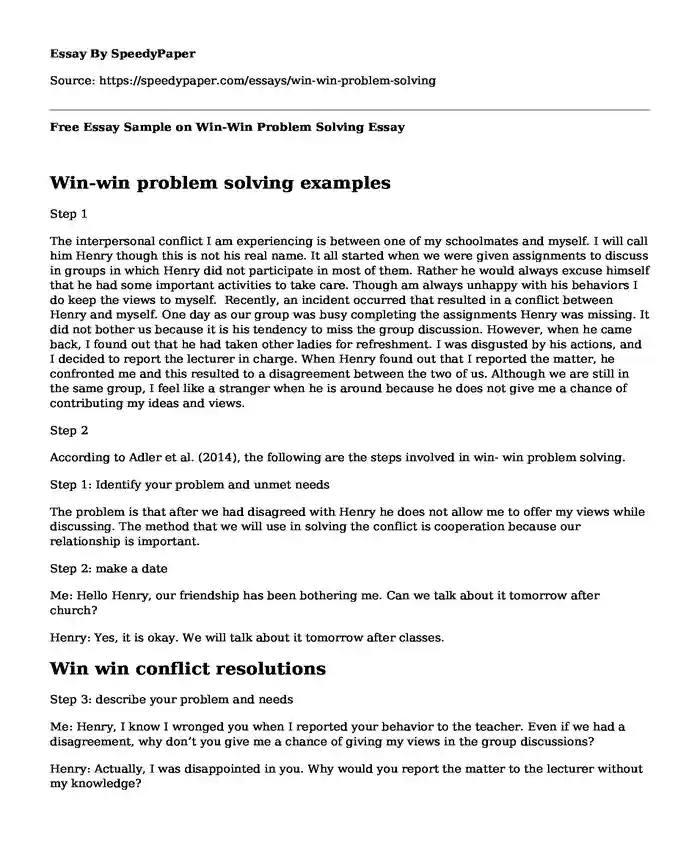
| Essay type: | Problem solution essays |
| Categories: | Communication Psychology Problem solving |
| Pages: | 3 |
| Wordcount: | 749 words |
Win-win problem solving examples
Step 1
The interpersonal conflict I am experiencing is between one of my schoolmates and myself. I will call him Henry though this is not his real name. It all started when we were given assignments to discuss in groups in which Henry did not participate in most of them. Rather he would always excuse himself that he had some important activities to take care. Though am always unhappy with his behaviors I do keep the views to myself. Recently, an incident occurred that resulted in a conflict between Henry and myself. One day as our group was busy completing the assignments Henry was missing. It did not bother us because it is his tendency to miss the group discussion. However, when he came back, I found out that he had taken other ladies for refreshment. I was disgusted by his actions, and I decided to report the lecturer in charge. When Henry found out that I reported the matter, he confronted me and this resulted to a disagreement between the two of us. Although we are still in the same group, I feel like a stranger when he is around because he does not give me a chance of contributing my ideas and views.
Step 2
According to Adler et al. (2014), the following are the steps involved in win- win problem solving.
Step 1: Identify your problem and unmet needs
The problem is that after we had disagreed with Henry he does not allow me to offer my views while discussing. The method that we will use in solving the conflict is cooperation because our relationship is important.
Step 2: make a date
Me: Hello Henry, our friendship has been bothering me. Can we talk about it tomorrow after church?
Henry: Yes, it is okay. We will talk about it tomorrow after classes.
Win win conflict resolutions
Step 3: describe your problem and needs
Me: Henry, I know I wronged you when I reported your behavior to the teacher. Even if we had a disagreement, why don’t you give me a chance of giving my views in the group discussions?
Henry: Actually, I was disappointed in you. Why would you report the matter to the lecturer without my knowledge?
Me: I am sorry for my behavior. All I need now is for us to be friends rather than strangers.
Step 4: check your partner’s understanding
Me: Have you understood what am trying to say, Henry? I would like our friendship to be good as we used to be.
Henry: it is okay, I am getting you. Friendship is an important tool. Thus, we should always retain it.
Step 5: Solicit your partner’s need
Me: Henry I guess you now know what I need, kindly tell me what you need from me.
Henry: All am asking is that you should always ensure that you do not report a matter to the lecturing before informing the person involved. The first step to take when you are disgusted with someone’s behavior is to inform him or her of the issue and only report to if the issue persists.
Step 3
Some of the pros of using this model include the fact that it results to solving the actual problem. Through this model, one can solve the real problem because the real problem is identified (Adler et al., 2014). Furthermore, it results in a win-win outcome in which both, the individuals involved in the situation collaborate and find a solution that satisfies both the parties. This model also reinforces mutual respect and trust because the ideas of both the parties are considered. Win- win solution is advantageous because it builds a good foundation to enhance effective collaboration in future. Moreover, through this model, one earns the reputation of being a good negotiator.
Although this model is useful in solving conflicts, it has some limitations including the fact that it needs a commitment from all the parties involved to find a mutually acceptable solution. The process also takes a lot of energy and money before finding a solution. Additionally, in some cases, other people’s openness and trust may be considered as an advantage. Furthermore, this method is not effective in a case where timing is critical, and a quick solution is needed (Adler et al., 2014).
Reference
Adler, R. B., Rodman, G. R., & DuPre, A. (2014). Understanding human communication. New York : Oxford University Press,
Cite this page
Free Essay Sample on Win-Win Problem Solving. (2017, Dec 18). Retrieved from https://speedypaper.net/essays/win-win-problem-solving
Request Removal
If you are the original author of this essay and no longer wish to have it published on the SpeedyPaper website, please click below to request its removal:
- Free Essay on How to Make Electricity
- Essay Example on Gender and Family
- Free Essay in Organizational Theory and Design: Air Canada
- Positive Human Rights Violations among UN Members States - Research Proposal Paper Sample
- Article Review Essay Sample: Recreating Drug Discovery for the 21st Century
- Free Essay: Western Heritage
- Paper Example on Pseudomonas Alkanolytica Using in Treatment
Popular categories




